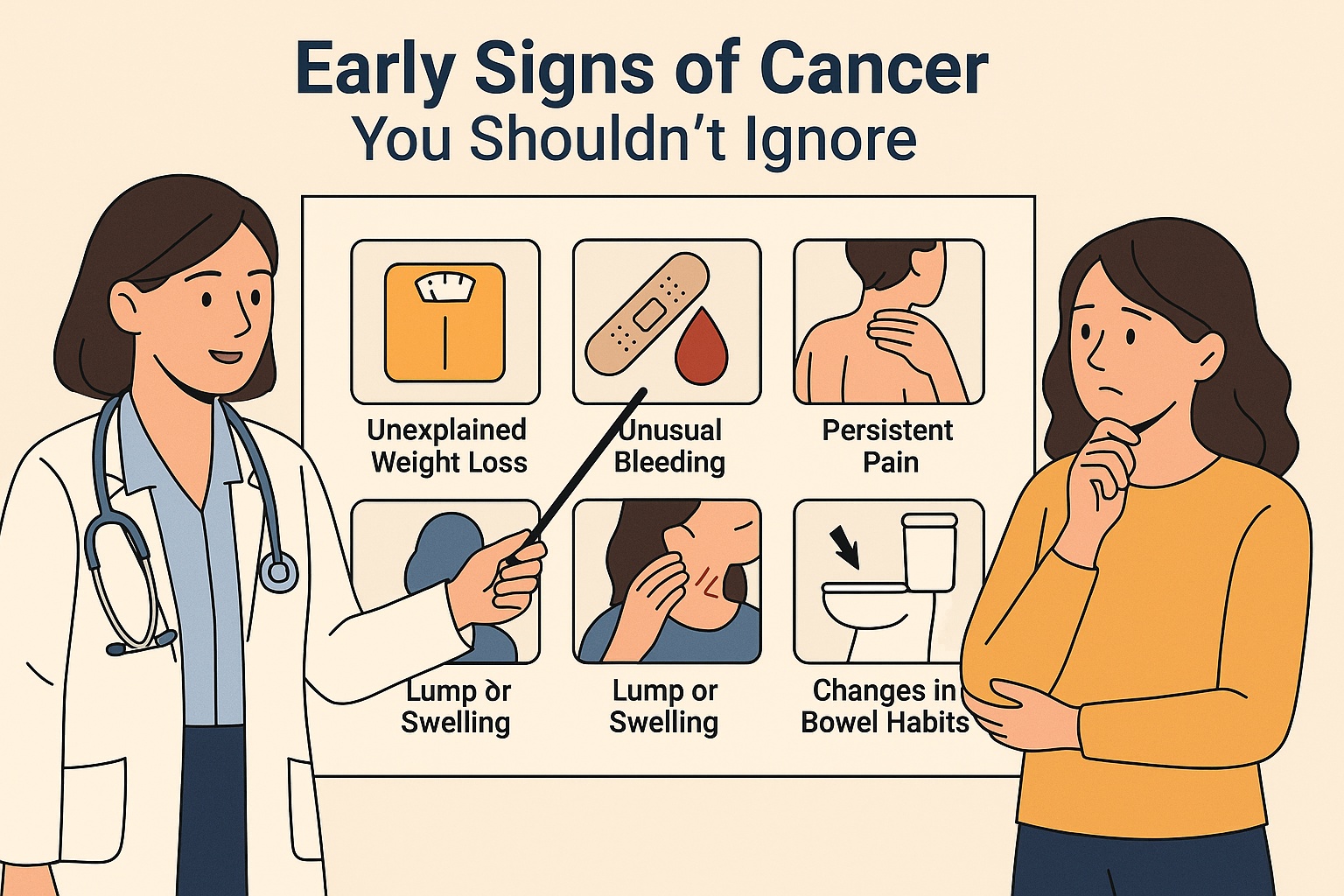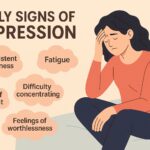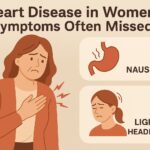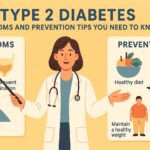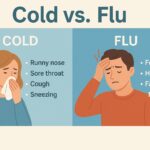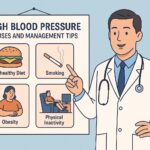Why Early Detection of Cancer Saves Lives
Early signs of cancer are often subtle, but recognizing them can lead to earlier diagnosis and better outcomes. In many cases, cancer starts silently and progresses without dramatic symptoms. That’s why being informed and proactive can make a significant difference. This guide outlines what to look for, how symptoms may vary, and when it’s time to talk to a doctor.
What Are Early Signs of Cancer?
Early symptoms differ depending on the type of cancer, but some warning signs are common across many forms of the disease. These signs don’t always indicate cancer—but they should never be ignored. Here’s what to watch for:
- Unexplained weight loss — Losing 10 pounds or more without trying could be a red flag, especially for pancreatic, stomach, lung, or esophageal cancer.
- Fatigue that doesn’t go away — Persistent tiredness not relieved by rest may signal leukemia or colon cancer.
- Persistent pain — Chronic pain in areas like the back, bones, or abdomen should be evaluated.
- Unusual bleeding or discharge — Blood in the stool, urine, or unusual vaginal bleeding can be early signs of cancer.
- Skin changes — New moles, changes to existing ones, or non-healing sores can indicate skin cancer.
- Lumps or thickening — A new lump in the breast, testicle, or other soft tissue may be the first noticeable symptom.
- Persistent cough or hoarseness — A cough that lingers for weeks or hoarseness could point to throat or lung cancer.
Common Cancers and Their Early Symptoms
Let’s look at several major cancer types and their most typical early signs:
- Breast cancer — Lump in the breast, skin dimpling, nipple inversion, or unusual discharge.
- Colorectal cancer — Blood in stool, abdominal pain, and changes in bowel habits.
- Lung cancer — Chronic cough, chest pain, coughing up blood, and shortness of breath.
- Prostate cancer — Weak urine flow, frequent urination (especially at night), or blood in urine.
- Ovarian cancer — Bloating, pelvic pain, and difficulty eating or feeling full quickly.
- Skin cancer (melanoma) — Irregular or changing moles; new pigmented lesions.
How to Know If a Symptom Is Serious
Not every ache, bump, or bruise is a sign of cancer. However, if any of the following applies, consult a medical professional promptly:
- Symptoms last longer than two weeks
- The issue is worsening over time
- You have multiple symptoms at once
- You have a personal or family history of cancer
When to Talk to a Doctor
If you experience any unusual changes in your body, don’t wait. Schedule a check-up with your healthcare provider. Diagnostic tests—such as blood work, imaging scans, or biopsies—can help confirm whether symptoms are benign or need further evaluation. Early-stage cancers are often more treatable and may require less aggressive therapy.
Diagnostic Tools Doctors Use
To investigate early signs of cancer, your doctor might order:
- Blood tests — To check for tumor markers or organ function abnormalities
- Imaging — CT scans, MRIs, X-rays, and ultrasounds help locate abnormal growths
- Biopsies — Tissue samples help confirm a cancer diagnosis
- Endoscopy or colonoscopy — For visual inspection of internal organs
Can Cancer Be Prevented or Reduced?
While not all cancers are preventable, lifestyle choices can significantly reduce your risk. The American Cancer Society recommends:
- Eating a plant-based diet rich in fruits, vegetables, and whole grains
- Exercising regularly (150 minutes per week of moderate activity)
- Not smoking and avoiding secondhand smoke
- Limiting alcohol consumption
- Staying up to date on screenings like mammograms, colonoscopies, and Pap tests
- Protecting your skin from UV radiation
FAQs About Early Signs of Cancer
- Can early signs of cancer be mistaken for other conditions?
Yes. Many symptoms overlap with other common health issues. That’s why it’s crucial to follow up with your doctor. - Are all lumps cancerous?
No. Many lumps are benign, but new or changing ones should always be evaluated. - Does cancer always show symptoms in the beginning?
No. Some cancers are “silent” and only present symptoms in advanced stages, which makes routine screenings vital.
Conclusion: Don’t Dismiss the Early Signs of Cancer
Staying informed about the early signs of cancer empowers you to take control of your health. While these symptoms don’t always mean cancer, ignoring them can delay diagnosis and reduce treatment options. Trust your instincts, listen to your body, and don’t hesitate to speak with a doctor. Early action can save your life.
